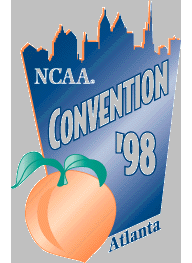The NCAA News - News and FeaturesJanuary 12, 1998
NCAA CONVENTION -- Division III legislation
Following is a summary of proposed legislation that will be considered January 12 by the Division III membership during the NCAA Convention in Atlanta:
Division III will tackle a relatively short agenda during its first legislative business session in the new governance structure.
 Division members will consider seven proposals -- including five sponsored by the Division III Presidents Council, acting on recommendations from the Division III Management Council and the Association's committee structure. Division members will consider seven proposals -- including five sponsored by the Division III Presidents Council, acting on recommendations from the Division III Management Council and the Association's committee structure.
Three proposals are deemed to be of particular interest to Division III chief executive officers and have been designated for roll-call votes -- including the only two proposals sponsored by member institutions.
Both member-sponsored proposals deal with playing-and-practice-seasons legislation, and both have attracted opposition from the Presidents Council.
One of those proposals would allow Division III institutions to begin on-court preseason basketball practice sessions October 15. Current legislation allows conditioning activities to begin October 15 without on-court practice.
The sponsoring institutions believe the proposal will give coaches additional time to teach fundamental basketball skills and techniques without requiring student-athletes who otherwise would be participating in conditioning activities to devote more time to the sport.
However, the Division III Management Council asked the Presidents Council to oppose the proposal as unnecessary, and because of its impact on student-athletes who participate in other sports in addition to basketball.
The other member-sponsored proposal involves women's lacrosse. It would permit sponsoring institutions to have 17 dates of competition in the sport during the traditional segment and five during the nontraditional segment.
The sponsors are seeking to create a nontraditional segment in women's lacrosse like the segments that currently exist in field hockey and soccer.
But the Management Council recommended the Presidents Council's opposition, based in part on a desire to halt further establishment of the nontraditional segment in Division III athletics. The Management Council also cited safety and conditioning concerns and the fact that there is no similar provision in men's lacrosse as other reasons for opposition.
The only other proposal scheduled for roll-call voting is a proposal to include conference staff members in legislation that currently prohibits student-athletes and institutional athletics staff members from participating in gambling activities.
Other proposals
Other proposals on the Division III agenda include a measure to revise criteria that NCAA institutions must comply with in order to be reclassified into Division III.
The proposal would extend from two to three years the period of time that a transferring member must comply with Division III legislation before achieving division membership.
It also would relieve such institutions from complying with Division III financial aid requirements during the first year of the three-year period, although a reclassifying institution would be prohibited from providing athletically related financial aid to incoming freshmen and transfer students.
The proposal also would require transferring institutions to complete an Institutional Self-Study Guide during the first year of the three-year period.
If adopted, the proposal would affect any institution that begins the initial year of its compliance period in 1998-99 or thereafter.
Division III members also will consider the following proposals:
* An NCAA Olympic Sports Liaison Committee proposal to permit Division III student-athletes to receive actual and necessary expenses to participate in Olympic tours or exhibitions involving Olympic team members and members of a national team. Student-athletes currently can receive expenses to participate in actual competition, but this proposal would permit participants in Olympics-related events to receive expenses even if there is no formal competition.
* Proposals recommended by the former NCAA Eligibility Committee that would (1) specify circumstances in which institutions will not be required to declare a student-athlete who receives an improper benefit ineligible, provided the student-athlete repays the value of the benefit, and (2) specify additional instances in which a violation of NCAA legislation would be classified as de minimus and would not render a prospective or enrolled student-athlete ineligible.
|